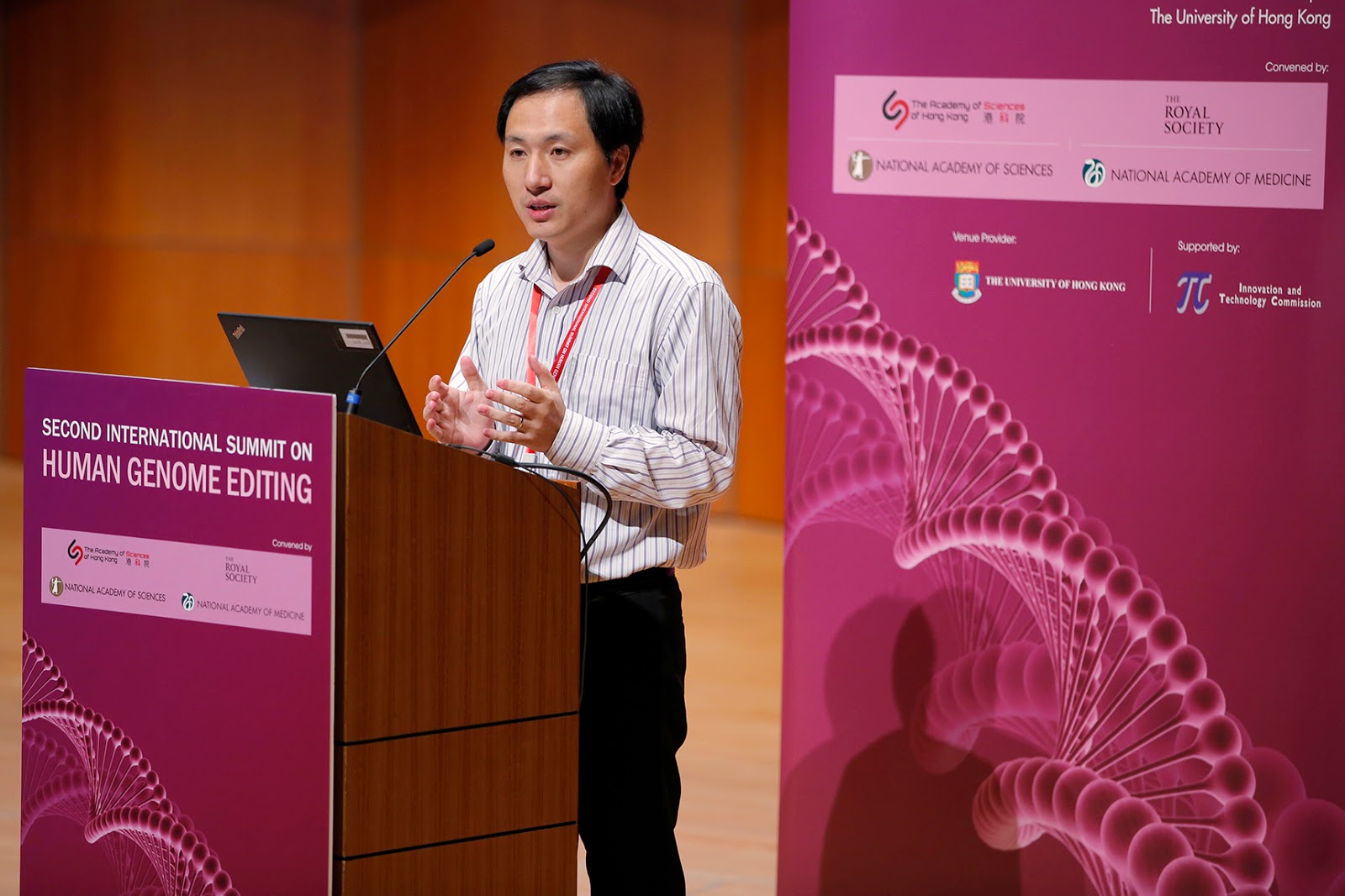"Summit Human Genome Editing" He Jiankui
SCIENCE & DISRUPT
He Jiankui at Summit on Human Genome Editing
On the eve of the Second International Summit on the Human Genome Edition, was informed to world on the birth of twins in China whose embryonic genomes had been edited. The researcher Leader is He Jiankui, that with CRISPR-cas9 technology managed to make this controversial scientific milestone, who now to speak in this summit and you can watch his presentation from Honh Kong to continue. The dialogue of this summit seach the global understanding of the problems related to the editing of the human genome, helping to ensure that human genome editing research is carried out responsibly, for the benefit of the whole society. This Summit will continue to advance the global dialogue on these issues by bringing together a broad range of stakeholders — including researchers, ethicists, policymakers, patient groups, and representatives from science and medical academies and organizations worldwide — to explore topics including: 1) potential benefits and risks inherent in conducting genome editing research and in considering clinical applications; 2) ethical and cultural perspectives; 3) legal, regulatory, and policy considerations; and 4) public outreach and engagement.
HUMAN GENOME EDITING
Second International Summit on Human Genome Editing
"We hope that the dialogue at our summit further advances the world’s understanding of the issues surrounding human genome editing. Our goal is to help ensure that human genome editing research be pursued responsibly, for the benefit of all society." Second International Summit on Human Genome Editing
Speakers:
Kathy Niakan, The Francis Crick Institute
Paula Amato, Oregon Health & Science University
Maria Jasin, Memorial Sloan Kettering Cancer Institute
Xingxu Huang, Shanghai Tech University
Jiankui He, Southern University of Science and Technology, presentation from 1:17:00 hrs in the video
Since the first international summit was held in 2015 in Washington, D.C., research on human genome editing has continued to advance rapidly. However, many questions remain about the science, application, ethics, and governance of human genome editing. Of particular concern is the possibility of heritable genome editing, which would alter the human germline, and applications for purposes other than to treat disease or disability.
The criteria under which heritable genome-editing clinical trials could be deemed permissible have been the subject of much debate and discussion by many research groups. Numerous studies have provided guidance for the conduct of heritable genome-editing clinical trials. One such study, a 2017 report by the U.S. National Academies of Sciences, Engineering, and Medicine, concluded that clinical trials might be permitted after peer-reviewed preclinical research further clarifies the potential risks and benefits, only for compelling medical reasons in the absence of reasonable alternatives, and with maximum transparency and strict oversight. The report noted that such research should be approached with caution and with broad public input. It specified a regulatory framework that included ten recommended criteria and structures. A second major report, released in 2018, which was the result of an independent inquiry by the Nuffield Council on Bioethics in the U.K., also specifies “circumstances in which heritable genome editing interventions should be permitted.” Whether the clinical protocols that resulted in the births in China conformed with the guidance in these studies remains to be determined.
Speakers: Jiankui He, Southern University of Science and Technology
Jiankui He is an associate professor at Southern University of Science and Technology at Shenzhen, China. He’s research focuses on genome sequencing technology, bioinformatics, and genome editing. His group has developed a single molecule genome sequencer, which can sequence the human without PCR amplification. He studied the CRISPR in bacteria immunity in 2009, and he is now focusing on improving the efficacy and safety of CRISPR-cas9 genome editing for therapeutics application. He was elected as “1000 Talents Program” experts in 2017. He received his Ph.D. at Rice University in Houston, Texas, and worked as postdoctoral research fellow in Stephen Quake lab at Stanford University.
Second International Summit on Human Genome Editing
Webcasting of day three of the Second International Summit on Human Genome Editing will begin Thursday, Nov. 29 at approximately 8:00 a.m. HKT [Wednesday, Nov. 28 at 7:00 p.m. EST].
Viewers may submit questions to geneediting@nas.edu.
Recorded Video Webcast:
Convened by:
The Academy of Sciences of Hong Kong
The Royal Society
U.S. National Academy of Sciences
U.S. National Academy of Medicine
Lee Shau Kee Lecture Centre
Centennial Campus
The University of Hong Kong
Centennial Campus
The University of Hong Kong
November 27-29, 2018
Please note all times listed are Honk Kong Time (HKT)
SOURCE He Jiankui and Second International Summit on Human Genome Editing
nationalacademies.org/hk
"No Copyright Infringement Intended, Strictly For Promotional Purposes Only! All Rights Reserved To Their Respective Owners."
"Copyright Disclaimer Under Section 107 of the Copyright Act 1976, allowance is made for "fair use" for purposes such as criticism, comment, news reporting, teaching, scholarship, and research. Fair use is a use permitted by copyright statute that might otherwise be infringing. Non-profit, educational or personal use tips the balance in favor of fair use."












































0 comentarios :